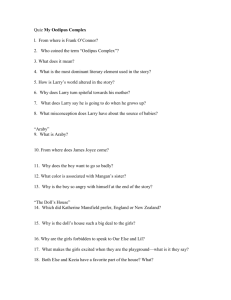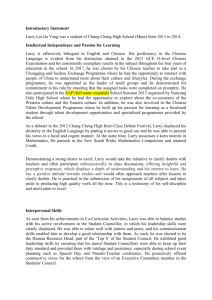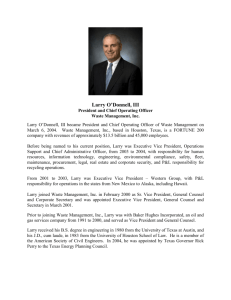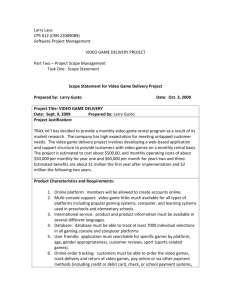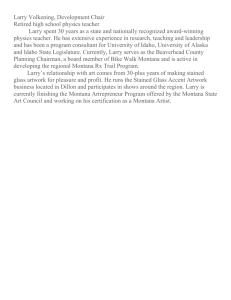Conflict Management
advertisement
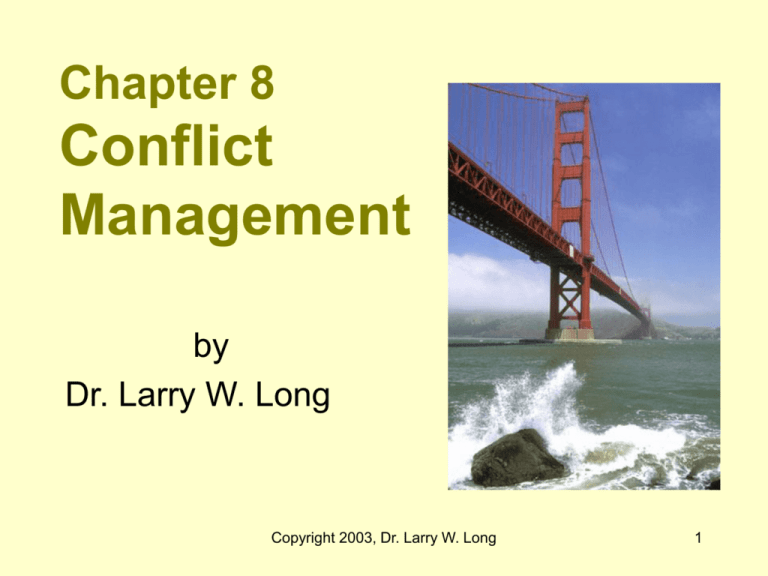
Chapter 8 Conflict Management by Dr. Larry W. Long Copyright 2003, Dr. Larry W. Long 1 Consequences of Conflict DYSFUNCTIONAL Coalitions, Isolation, & lower participation Gatekeeping Deception Lowered satisfaction Lowered productivity Compliance reliance FUNCTIONAL Cohesion Greater motivation Better problem solving Goal attainment Benefits for others Reality adjustment Copyright 2003, Dr. Larry W. Long 2 Defining Conflict • Conflict – Two or more competing, often incompatible, responses to a single event Copyright 2003, Dr. Larry W. Long 3 Identifying Conflict • Differentiate between symptoms and causes • Requires valuesystem definition – Conflict often arises because people hold different values • A precondition to effective conflict management Copyright 2003, Dr. Larry W. Long 4 Locating Conflict • Conflict must be located before actual management can begin. • Locating conflict is similar to problem identification. Copyright 2003, Dr. Larry W. Long 5 Conflict Locations • • • • • • Intrapersonal Interpersonal Intragroup Intergroup Intraorganizational Interorganizational Copyright 2003, Dr. Larry W. Long 6 Communication induced conflict . . . occurs when different information exists. . . . different problems and solutions are identified. . . . different behavior regulation strategies are preferred . . . . different conflict management strategies are preferred. Copyright 2003, Dr. Larry W. Long 7 Localizing Conflict • Specifically define the boundaries of the conflict. • Nurture conflict when functional; Reduce when dysfunctional • Ability to locate and assess conflict will determine effectiveness of regulation. Copyright 2003, Dr. Larry W. Long 8 Evidence of Conflict Occurs No Conflict/Communication Location Matrix Yes Information Management Intrapersonal? Yes Select A Strategy Yes Select A Strategy No Interpersonal? Yes No Yes No Problem/Solution Identification Intragroup? No Intergroup? No Yes Conflict Management No IntraOrg? Yes Yes Select A Strategy Yes Select A Strategy No No InterOrg? No Yes Behavior Regulation Copyright 2003, Dr. Larry W. Long 9 Strategies for Managing Conflict • Power: Both advocate -- win-lose • Compromise: Middle-ground solution sought -- lose-lose • Creative Alternative: search for consensus -- win-win Copyright 2003, Dr. Larry W. Long 10 Strategy for Managing Conflict • Some tactics can be used in either situation, but certain elements of thirdparty intervention are distinctive: – Collaboration – De-escalation – Facilitation Copyright 2003, Dr. Larry W. Long 11 Tactics for Managing Conflict – Focus and contain conflict – Control levels of threat – Clarify management policies on communication – Identify conflict early – Balance dependencies – Evaluate motivational preference – Use appropriate strategies Copyright 2003, Dr. Larry W. Long 12 Personal Conflict Styles • Influence the way conflict is identified, defined, located and localized. • Determine if conflict will be escalated, maintained, reduced, or avoided. • Are characterized by a desire to satisfy one’s own interests. Copyright 2003, Dr. Larry W. Long 1040-A 13 Personal Management Styles Assertiveness Toward Own Goals HIGH LOW “DRIVER” Power Strategist (Dominator) “EXPRESSIVE” Creative Alternative Strategist (Integrator) Compromise Strategist (Compromiser) “ANALYTIC” Avoidance/”Slow-paced” Strategist (Neglecter) “AMIABLE” Accommodation Strategist (Appeasement) Responsiveness Toward Other Party’s Goals Copyright 2003, Dr. Larry W. Long HIGH 14 What Kind of Manager Are You? • Are you highly competitive? – You might be a gaming manager. • Characteristics: – Competitive – Conflict strategy is win-lose – Clear distinctions between supervisors and subordinates – Driver social style - pushy, severe, tough, strong-willed Copyright 2003, Dr. Larry W. Long 15 What Kind of Manager Are You? • Are you overly sensitive? – You might be a tentative manager. • Characteristics: – – – – Desire to keep people happy Conflict strategy is appeasement Negatively view conflict Amiable social style Copyright 2003, Dr. Larry W. Long 16 What Kind of Manager Are You? • Are you a performer? – You might be an idealistic manager. • Characteristics: – Believes every problem has solution – Conflict Strategy is win-win – Endeavor to be an active leader – Expressive social style: manipulative, excitable, friendly, a bit dramatic Copyright 2003, Dr. Larry W. Long 17 What Kind of Manager Are You? • Are you adaptive? – You might be a versatile manager. • Characteristics: – Possess ability to adapt to others – Conflict strategy varies depending on situation – Multidimensional thinkers – Tolerant of ambiguity – Flexible Copyright 2003, Dr. Larry W. Long 18
